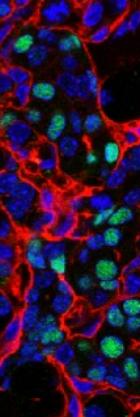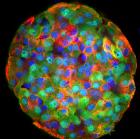 |
||
type 1 diabetes Type 1 or juvenile diabetes occurs when the insulin-producing β-cells within the pancreatic islet die. This results in a decrease in insulin secretion, a decrease in circulating insulin and an increase in blood glucose levels. Elevation in blood glucose leads to most of the complications associated with diabetes. In order to lower blood glucose levels and slow the development of the disease insulin injections or infusions are prescribed. The cause of type 1 diabetes is not clear; although, in most cases it appears to develop as the result of an auto-immune reaction against the insulin-producing cell. Because over 80% of the insulin secreting β-cells are lost prior to development of overt type 1 diabetes and since the remaining β-cells remain under immune attack, it will be important to understand how we can reduce the immune destruction while simultaneously increasing the number of insulin producing cells. Our research is targeted at understanding how we can make more β-cells for transplantation and thereby replace the insulin-producing cells that are lost in juvenile diabetes. |
||


